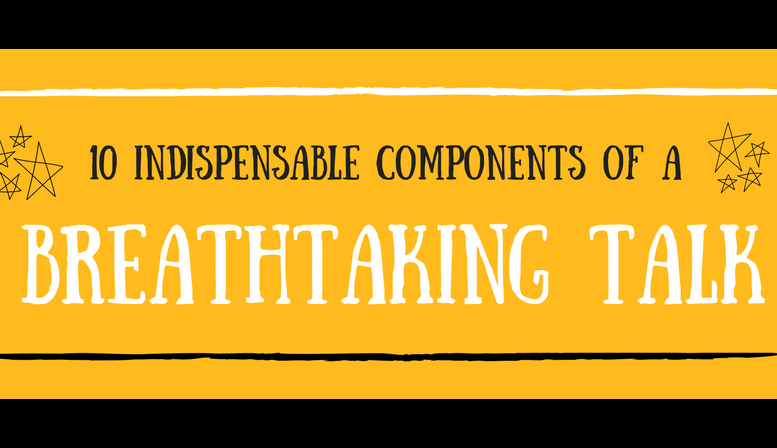10 Indispensable components of a breathtaking talk

When a speaker needs inspiration, they usually start listening to some of the greatest speeches of all times.
Is that enough?
The good news is that this practice does help you get inspiration.
The bad news is that listening is not enough.
You have to master the art of speech-listening.
Yes, there is such thing.
It’s all about identifying the elements of a message that make it so impactful.
That’s not a hard thing to do.
We’ll list the 10 indispensable components of a breathtaking talk. Does your talk have them all?

1. Content is king
Great talks start by being great on paper.
It’s not just about the speaker’s tone and hand gestures. It’s about the words themselves.
A great talk is relevant and it makes people care about specific issues. It’s also credible and memorable, and it calls to action. All these elements are visible in the content itself.
According to Joanna Ford, a speech writer at Rush My Essay, there are few components that make for a great piece of content: “Unique voice, clear message, and rhythm - those are the things a good speech needs,” - she says. “Your idea has to be unique and you have to make it obvious from the very introduction. As for the rhythm, you can make an impact with brief and clear, but emotional sentences.”
Here is what you should be looking achieve with your content:
-
unique ideas
-
clear message
-
impactful rhythm
2. Self-confidence
Lack of self-confidence while giving a presentation may be cute only in extreme situations.
Most of the time, people expect to see a confident person giving a talk.
They want to see an expert they can learn from.
Great speakers are not born without nerves, of course they’ve had their share of anxiety. However, they managed to overcome it.
Thandie Newton, a successful actress, found a way to turn the lack of self-confidence to her advantage. In her great TED talk, she said:
“When I’m acting a role, I inhabit another self, and I give it life for awhile, because when the self is suspended so is divisiveness and judgement…I honestly believe the key to my success as an actor and my progress as a person has been the very lack of self that used to make me feel so anxious and insecure.”
Get into that role. If you’re not self-confident enough, act like you are.
Self-confidence is a critical element of a great talk. You’ll achieve it through tons of practice.
You must also pay attention to the way your talk is written. When you’re sure it’s great, you’ll be more confident that you’ll make a positive impact with it.
When you’re sure it’s great, you’ll be more confident that you’ll make a positive impact with it.
3. Use your personality
No matter how many times you listen to Obama, Tony Robbins or any of the greatest presenters of all time, you can’t just pretend to be them: you can’t be someone you’re not.
The only way to give a good talk is by being yourself.
When I said you should get in the role of a confident speaker in the previous tip, that didn’t include losing yourself. A speech needs its stamp of personality.
-
Experiment with different styles, but they stick to ones that express your personality, as well as the passion and commitment regarding the things you say.
-
Share personal experiences or anecdotes.
-
Use language you would normally use. Don’t use jargon or complicated vocabulary with the hope they will make you seem smarter.
-
Speak from the heart. Believe what you’re saying!
4. A strong opening line
The message has to be clear from the very first sentence.
When you listen to Charles de Gaulle’s The Appeal of 18 June, the inspiring message stays with you for a long time: “Do not give up hope!”
That’s what breathtaking talks are made of.
Here are some more examples of inspiring openings:
“I feel that this award was not made to me as a man, but to my work - a life's work in the agony and sweat of the human spirit, not for glory and least of all for profit, but to create out of the materials of the human spirit something which did not exist before. So this award is only mine in trust.”
-William Faulkner (Nobel Prize Acceptance Speech)
“I am happy to join with you today in what will go down in history as the greatest demonstration for freedom in the history of our nation.”
-Martin Luther King (I Have a Dream)
“Four score and seven years ago our fathers brought forth on this continent, a new nation, conceived in Liberty, and dedicated to the proposition that all men are created equal. Now we are engaged in a great civil war, testing whether that nation, or any nation so conceived and so dedicated, can long endure. We are met on a great battle-field of that war. We have come to dedicate a portion of that field, as a final resting place for those who here gave their lives that that nation might live. It is altogether fitting and proper that we should do this.”
-Abraham Lincoln (The Gettysburg Address)
5. Credibility
You can’t just convince the listeners that you’re saying something valuable.
You have to earn their trust.
-
You’ll do that by introducing facts or personal experiences that support your arguments.
-
Your self-confidence is another important factor that adds to the credibility.
-
Be sincere. Say only the things you believe.
-
Talk only about things you know of. A great speech is based on knowledge, experience, and insight.
-
Invite your audience to take part in the experience. Allow them to ask questions and answer them.
-
Be the message. The audience should sense the message in your tone, body language, and facial expressions.
6. Effective body language
In modern talks, given directly in front of an audience, effective body language is crucial.
TED Talks, in particular, are recognized for the way the speakers interact with the audience. They rule the stage.
Can you imagine a speaker who stands stiff and only talks?
That’s not who you want to be. Confident body language is a crucial element of a great presentation. Stand up straight, use the entire stage, and use your entire body to express passion and emotion.
Take J.K. Rowling’s Harvard Commencement Speech as an example.
She wasn’t given a big stage to rule. Still, she doesn’t just stand and speak.
She uses hand gestures, eye contact and facial expressions to make an impactful connection with the audience.
7. Straightforward introduction
Have you ever seen a talk where the speaker gets up and immediately starts apologizing?
Perhaps for something that has gone wrong with the tech, their unworthiness of being called an expert, or how they hope people will forgive them this or that.
This jeopardizes your credibility immediately.
Likewise, it is not necessary to start a talk with an overly expressive “thank you” session. This is not an Oscar speech. if you really do feel thankful, express your gratitude at the end of the talk.
Your introduction counts. You have about 10 seconds to convince the audience that you’re worth listening to and that they will gain value from paying attention to your talk.
Make an impact and do not waste that precious time.
8. Charisma
When you’re listening to a great talk, the speaker’s words and gestures are like a magnet to your attention. It’s not only about the words and gestures, though. It’s about the charisma.
Developing charisma is not the easiest thing in the world. You have quite a few things to pay attention to:
-
Be present in the moment;
-
Stay confident in what you say;
-
Don’t try to teach; try to have a conversation;
-
Make eye contact;
-
Use your body to express the message, just as you use your voice.
The good news is that it’s something you can learn. You already have a great personality. You just need to let it shine.
9. Be concise
No matter how eloquent a great speaker is, they are always trying to connect with the audience.
That’s an impossible thing to do if the talk is consisted of endless, boring sentences. You want an example? Just watch the debates in the UK Parliament for an hour and you’ll get the point.
A great talk has brief sentences, with proper pacing and structure. Steve Jobs’ Stanford Commencement Address is a nice example of that.
The speaker uses different types and styles of sentences, in a combination that gives a distinctive rhythm to the talk.
10. Calm tone of voice
A warm, supportive voice is one of most important elements of a great talk.
People relate the high pitch and fast talk to bad news and uncomfortable situations.
Whereas if you drop your pitch and slow down too much, you’ll have their sympathy.
Monotonous, flat voice is acceptable only when you’re trying to express sadness. When you’re trying to express strong emotions like fear, anger, or excitement, you may raise the intensity of your voice. However, make sure to stay calm and adjust the tone in accordance with the emotions you’re trying to convey.
A great talk has power. It perfectly combines all elements in a unique outcome. It stays with the listener for a long time. Do you have what it takes? You’ll get there if you keep working on all important elements of your message.





